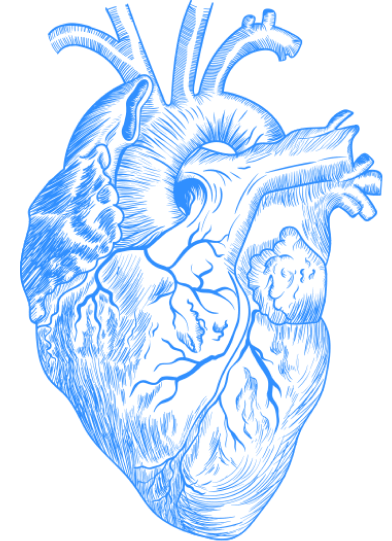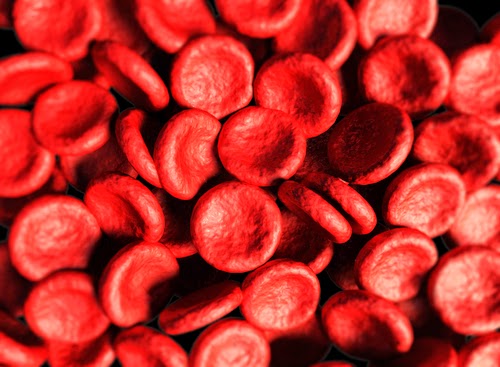
He lay in the hospital bed, belly-up, staring at the ceiling. We knocked as we entered and asked the patient a barrage of questions. How was he feeling? What doctors had he seen in the past? What other medical conditions did he have? When did he first start to notice uncontrolled nosebleeds? What other symptoms did he notice? An endless series of questions for a patient already overwhelmed with newly diagnosed leukemia, a cancer of white blood cells. As these cells proliferate uncontrollably due to bone marrow dysfunction, they crowd out other cells in the blood. Platelets, for example, which create clots to stop bleeding, decrease in number leading to spontaneous bleeding. White cells malfunction, allowing bacteria, fungi, and viruses to slip past the body’s floundering immune system. Patients with certain types of leukemia also develop an enlarged spleen, called splenomegaly. This occurs because the body looks for places other than the bone marrow to produce blood products. The spleen and liver are two organs capable of producing red blood cells (or once were during embryonic development). They enlarge in their attempts to compensate for bone-marrow failure.
 |
| Red blood cells. Image via Shutterstock |
“Come over here and feel this,” the attending physician said to the three of us, all medical students, after interviewing the patient and performing a physical exam. “Is it alright if they feel for your spleen?” he asked. After the patient assented, the three of us, one by one, began to poke on the left side of his abdomen, palpating up and down and subsequently tapping and listening for when our taps became dull or tympanic. We searched for where the spleen began and ended. And there it was, a large, blown-up balloon inside the patient’s belly, squirming around as we attempted to assess its size through palpation. We stood in line, each excitedly repeating what the previous student had done. It was, after all, the first time any of us had ever felt splenomegaly. In this particular interaction we converted this human being into a test tube by observing, exploring, feeling, and assessing, detached from the reality of the patient’s experience.
We do this regularly during our third year of medical school — we violate patients’ privacy for the sake of our education. Part excited, part nervous, part sheepish, we come when called by our teachers to listen to lung sounds and heart sounds; to inspect wounds and infections; to feel for various organs, tendons, and muscles in living human bodies. Though this experience feels new and uncomfortable for us, it is worth noting that medical students have learned in this way — with a lot less regard for the patient — for quite some time.
In a 1946 issue of Now, a political and literary journal, George Orwell published an essay entitled “How the Poor Die.” In this essay we accompany Orwell, who in 1929 experienced a bout of severe pneumonia, through a frightening, dark, and even humorous tour of a French hospital he simply calls the Hôpital X.
 |
| Image via Shutterstock |
Orwell describes the admissions process: “I was kept answering questions for some twenty minutes before they would let me in…. At my back a resigned little knot of patients, carrying bundles done up in coloured handkerchiefs, waited their turn to be questioned.” From here, with a 103 degree fever, Orwell disrobed, put on a short hospital dressing gown and walked, without shoes, 200 yards outside on a February evening to his hospital ward. Unfortunately, his quarters were no better than the journey to them. There was a “foul smell, faecal and yet sweetish,” [my comments on hospital smells are here] and the room contained three rows of beds “surprisingly close together.” It seems, from Orwell’s description, to have been more of a mess hall than a hospital floor.
In the bed across from him, Orwell witnessed a patient undergoing a medical procedure: “a doctor and a student performed some strange operation on him. First the doctor produced from his black bag a dozen small glasses like wine glasses, then the student burned a match inside each glass to exhaust the air, then the glass was popped on to the man’s back or chest and the vacuum drew up a huge yellow blister…. It was something called cupping, a treatment which you can read about in old medical text-books but which till then I had vaguely thought of as one of those things they do to horses.” (A recent review of the efficacy of this treatment has shown the evidence for it to be largely inconclusive.)
Subsequently, Orwell, who ostensibly also required cupping for his illness, joined in the medical education as “the doctor and the student came across to my bed, hoisted me upright and without a word began applying the same set of glasses, which had not been sterilized in any way. A few feeble protests that I uttered got no more response than if I had been an animal.” And in his classically dark humor, Orwell notes, “I was very much impressed by the impersonal way in which the two men started on me…. It was my first experience of doctors who handle you without speaking to you or, in a human sense, taking any notice of you.”
On a daily basis, nurses woke the patients at five in the morning and measured their temperatures but never washed them. Orwell remarks, “if you were well enough you washed yourself, otherwise you depended on the kindness of some walking patient.” The doctor typically dropped by later with interns and medical students and “there were many beds past which he walked day after day, sometimes followed by imploring cries.” Only if there was a patient with some interesting medical illness or presentation would the doctors attend to them. The attention they paid Orwell was almost too much for him, with “a dozen students queuing up to listen” to his chest.
It was a very queer feeling — queer, I mean, because of their intense interest in learning their job, together with a seeming lack of any perception that the patients were human beings. It is strange to relate, but sometimes as some young student stepped forward to take his turn at manipulating you he would be actually tremulous with excitement, like a boy who has at last got his hands on some expensive piece of machinery…. You were primarily a specimen, a thing I did not resent but could never quite get used to.
Orwell proceeds to describe in great detail the other patients in the hospital, a potpourri of characters. We read about an older man who cannot urinate, and about a veteran of the Franco-Prussian War of 1870, dying as female relatives look on, “obviously scheming for some pitiful legacy.”
Then Orwell discovered a patient with cirrhosis of the liver due to alcoholism (a surprisingly common type of patient in hospitals these days, too). “About a dozen beds away from me was Numéro 57 — I think that was his number — a cirrhosis-of-the-liver case.” This patient’s liver was so enlarged that he was “a regular exhibit at lectures.” The physician lectured to the medical students on 57, describing the particular physical findings of someone with chronic alcoholism and an enlarged liver. The doctor felt for the patient’s liver and showed his students what it was like. “Utterly uninterested in what was said about him, [the patient] would lie with his colourless eyes gazing at nothing, while the doctor showed him off like a piece of antique china.”
Numéro 57 died in the middle of the night, although no one knew it until the morning. “This poor old wretch who had just flickered out like a candle-end was not even important enough to have anyone watching by his deathbed. He was merely a number, then a ‘subject’ for the students’ scalpels.” Orwell, as soon as he had gained enough strength, fled the hospital: “it was a hospital in which not the methods, perhaps, but something of the atmosphere of the nineteenth century had managed to survive, and therein lay its peculiar interest.”
Finally, Orwell offers an incisive comment on hospital medical care: “Whatever the legal position may be, it is unquestionable that you have far less control over your own treatment, far less certainty that frivolous experiments will not be tried on you, when it is a case of ‘accept the discipline or get out.’” Orwell directs his social critique at hospitals which treated and took advantage of the poor — forcing them into crowded quarters, ignoring their cries for help and even operating on them without anesthetic.
 Despite the comparative pleasantness of my own experience in my medical studies, whenever I read this essay I wince at Orwell’s descriptions because of how familiar they are to me. The instances of the patient as a kind of specimen resemble in some remarkable ways the example I gave at the beginning. To be sure, we always thank a patient, ask if we can perform the appropriate physical exam maneuver, and acknowledge the patient’s right to refuse an exam. Nevertheless, we treat the patient as a test subject, which, however unfortunate, is necessary for our future profession. As patients we must ask ourselves whether we want to be treated by physicians who have never heard wheezes on a physical exam or never felt for an enlarged liver. Patients at teaching hospitals indeed make sacrifices for our education and for the welfare of our future patients.
Despite the comparative pleasantness of my own experience in my medical studies, whenever I read this essay I wince at Orwell’s descriptions because of how familiar they are to me. The instances of the patient as a kind of specimen resemble in some remarkable ways the example I gave at the beginning. To be sure, we always thank a patient, ask if we can perform the appropriate physical exam maneuver, and acknowledge the patient’s right to refuse an exam. Nevertheless, we treat the patient as a test subject, which, however unfortunate, is necessary for our future profession. As patients we must ask ourselves whether we want to be treated by physicians who have never heard wheezes on a physical exam or never felt for an enlarged liver. Patients at teaching hospitals indeed make sacrifices for our education and for the welfare of our future patients.
Orwell also points out the patients’ abdication of privacy in the hospital. Unquestionably, this is accurate even today. When patients arrive, they put on a hospital gown, or uniform, depending on how you look at it. The gown is, humiliatingly, almost completely open in the back except for a meager string that, even after being tied, barely holds the back together. With the uniform on, they become hospital patients under the supervision and care of the nursing staff and doctors. Each patient has the same gown with the same color scheme. Each patient is similarly under our watch.
When we enter a patient’s room, the knock at the door is more of an announcement than a question. Overnight, patients are poked and prodded for their blood samples. How strange that even their blood seems to be property of the physicians, nurses, and lab technicians. Many patients are attached to an IV pole which holds bags of fluids and medications being pumped into their veins. And thus, they cannot get up without dragging hospital property along with them. Of course, the staff does not usually treat patients like hospital property; of course, patients can choose to leave at any time; and of course, patients are there so they can get better. Regardless, the situation is one in which a patient submits himself or herself to the hospital so completely that, inevitably, some aspect of the patient’s sense of privacy, independence, and humanness is lost.
Even taking all these similarities into account, Orwell’s hospital experience is more of a nightmare from our perspective. But the parallels should give us pause. Has something of the atmosphere of the nineteenth century managed to survive even in the latest and best conditions? Must it?
